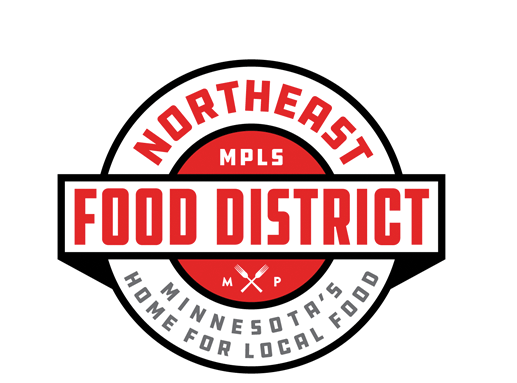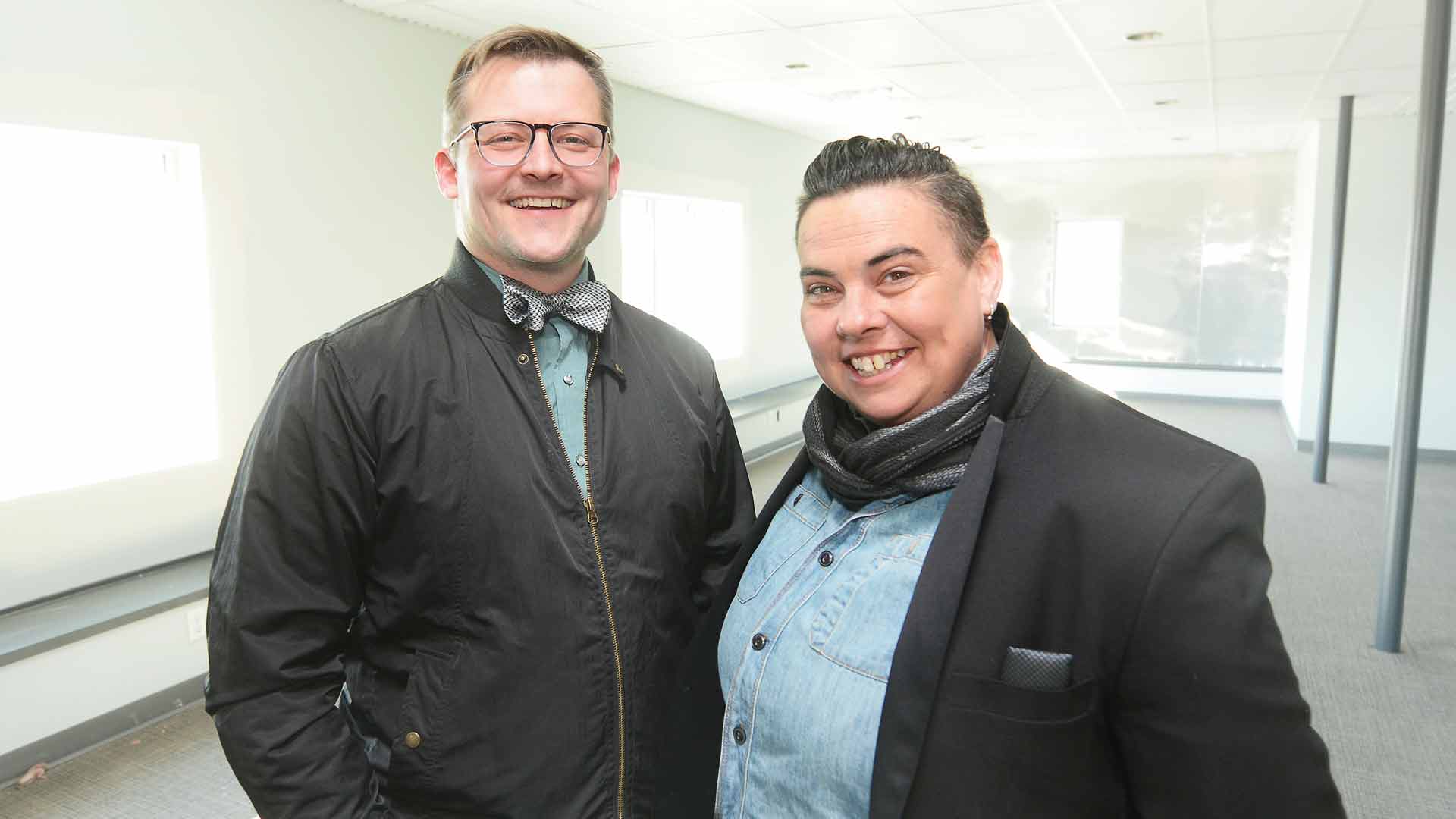Midwest Pantry and its NE Food District lower hurdles that encumber food entrepreneurs
by AURI
Midwest Pantry’s Zoie Glass is an avid ice fisher. She finds it relaxing, but one also could reasonably conclude her on a frozen lake dreaming up yet another service – such as supplying raw materials to any of the six tenant partners at the Northeast Food District in Minneapolis. The thought’s not too far-fetched: Contained on NE Food District’s eight-acre campus is what’s largely a turnkey operation for any entrepreneur who has a food idea and wants to bring it to market.
Glass and her partner, Chad Gillard, started Midwest Pantry in 2010. They’d met three years earlier while selling products at local farmers’ markets – she jam; he aebelskivers, a Danish cousin of the pancake. Soon they started sharing ideas, cross-promoting and generally planting the seed that would sprout the idea for a collaborative shared space where food entrepreneurs of all stripes could go to affordably access knowledge, expertise, and the facilities required to develop and market a food product.
“We realized there’s a lot that has to happen between simply having a product and selling it successfully,” Glass says. “We’d discovered the benefits of leveraging the expertise of others and saw value in common, shared spaces entrepreneurs could access on a much more reasonable budget. The whole idea made sense to us.”
Not small thinkers and blessed with innate savvy, Glass and Gillard embarked on a journey to realize their vision. Enter Minneapolis real estate developers Ellis Properties. With the added activity and traffic that came with the completion of the renovation of a nearby bridge, along with the gentrification of Northeast Minneapolis, Ellis thought it prudent to upgrade a 10,000 square-foot property it owns in the area. Ellis liked Midwest Pantry’s concept for a collaborative food innovation district. A partnership – and the NE Food District – were born.
Work on Phase One began in 2017. The space features six production kitchens, a walk-in cooler, a loading dock and staff to oversee everything. NE Food District’s tenant partners sign a three-year lease for a set rate and can access the space 24/7/365. To be selected to participate, candidates must have a good foothold in wholesale operations and possess a measure of business acumen – especially an understanding of the costs they’ll encounter to do business as a food entrepreneur.
Phase Two includes offices, co-worker space, meeting rooms and an event center, all exclusively for food enterprises, paid for based on frequency of use.
A third phase will add additional kitchens and seek to better accommodate specific companies that are further along in the product development process and need customized facilities.
But, as Glass was quick to mention, developing a product with potential is only the beginning of the journey. At some point, fledgling food entrepreneurs need to take off the apron and pick up a briefcase. Helping them navigate the many facets of getting their product to the store – and off the shelves is a key component in Midwest Pantry/NE Food District’s raison d’être.
For example, Midwest Pantry collaborates with the Carlson School of Business at the University of Minnesota to offer courses on raising capital, understanding wholesale pricing as well as instruction on trade show booth design and merchandising.
 Glass also works to lower other, often prohibitively high, start-up costs. For one, to get noticed and in front of buyers generally requires getting on the trade show circuit.
Glass also works to lower other, often prohibitively high, start-up costs. For one, to get noticed and in front of buyers generally requires getting on the trade show circuit.
“Trade shows generally take place on either coast, and fees to participate can exceed $10,000,” she says. “Then add the cost of getting yourself and your booth there and back. We needed to move the action closer to home, so we sponsor semi-annual trade shows – for which booth space rents in the $400 range – and a retail holiday market to give our local producers a shorter, more direct path to retail distribution.
Glass knew from experience that packaging isn’t cheap, typically because of very high minimum orders: The alternative is smaller orders where shipping can drive the cost per piece into the stratosphere. So she and Gillard partnered with Minneapolis-based Gamer Packaging. They established an on-site packaging warehouse that eliminates shipping costs and works with a tenant partner to find economical packaging options that effectively present the brand without breaking the bank.
Kitchen equipment’s not cheap, either. So, rather than each tenant partner individually ordering what they needed, Glass assembled a product list that included everyone’s requirements, bid the entire package and offered everyone better pricing.
And then there’s marketing. Glass is always promoting her tenant partners’ products, in fact, she placed tenant Twisted Shrub’s mixers in the media Green Room at Super Bowl LII. She believes the opportunity to represent all of her clients together creates a synergy that narrows disadvantage small entrepreneurs encounter.
To hear Glass tell it, AURI’s involvement provides a resource essential to the NE Food District mix. For example, Scott Dillon started Twisted Shrub to develop and sell his interpretation of the vinegar-based mixer that’s generally combined with fruit to create a refreshing addition to alcoholic or non-alcoholic beverages. When he bumped up against the need for a nutrition facts label, he called AURI for help.
“AURI had the people on staff with the expertise to get me past the ‘scientific’ requirements of bringing my shrubs to market,” he says. “When I modified a flavor, it required a new nutritional analysis that in turn required a new nutrition facts label. Thanks to AURI, that process moved quickly, capably and cost-effectively.”
AURI works in other ways, too. Take Jeff Casper. He’s a food scientist whose 18 years of industry experience includes product development and management roles at Pillsbury, General Mills, and Cargill as well as R&D roles at Horizon Milling and back at Cargill. In 2015, he left the science of large-scale food creation and turned his curiosity towards building something local: a small business that cultivates artisan grain methods to create premium, fresh pasta, sold under his Dumpling & Strand brand. He, too, discovered a need for AURI’s services.
“AURI was extremely valuable, as they were able to corroborate on the nutritional information I’d developed,” he says. “Their analysis of my formulations made it easier to proceed with confidence.”
The staff at AURI relishes these kinds of opportunities.
“Helping food entrepreneurs like the tenant partners at NE Food District is spot-on with our mission,” says AURI executive director Shannon Schlecht. “There’s strength in innovation districts comprised of companies in close proximity that can share best practices, collaborate and cultivate a culture of success. AURI expects to have an ongoing presence at NE Food District and be an essential element in its scope of services.”
Schlecht also identifies a huge benefit to food entrepreneurs located in Greater Minnesota.
“When those food businesses from outside the Twin Cities need to travel into the metro area, they now have one hub to which they can go to access resources or conduct meetings,” he says. “This access could be a far better arrangement than scampering all over town or moving from coffee shop to coffee shop.”
Glass appreciates the partnership, too.
“I’ve looked, and nowhere in the nation have I found the type and level of technical support food entrepreneurs can get from AURI,” she says. “And AURI services are affordable. For example, instead of paying $2,500 for a Nutrition Facts label, AURI can assist in creating a label for less than 10 percent of that. AURI makes the barrier much lower.”
All of this adds up to moving Midwest Pantry closer to its ultimate goal: to make Minnesota the nation’s go-to location to start and grow a food company.
“The idea of Midwest Pantry and the NE Food District is to connect and pay it forward,” she says. “It’s important that we’ve created a common space where entrepreneurs can affordably develop their products and get help to successfully bring them to market. But the more valuable accomplishment may be that we’ve established a base where entrepreneurs can connect to network and share ideas. I’m amazed at the extent to which companies are willing to help one another. Fostering this type of interaction is what we’re all about.”
There are still opportunities in the NE Food District! To learn more, email zoie@midwestpantry.com or chad@midwestpantry.com
